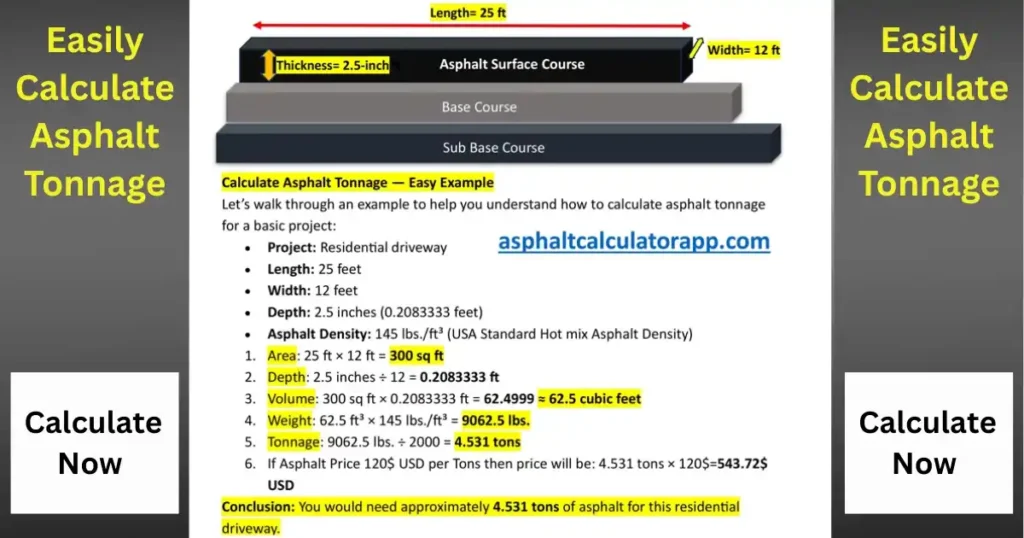To calculate asphalt tonnage, you need to determine the volume of asphalt needed (length × width × depth) and then multiply that by the density of the asphalt mix (USA Standard Hot Mix Asphalt weighs about 145 pounds per cubic foot). Finally, convert the result from pounds to tons. This method ensures you order the right amount of material for your paving project—avoiding costly overages or shortages. Whether you’re paving a driveway or planning a commercial lot, this guide simplifies the math.
Need Asphalt Estimate. Use our best easy online Asphalt Calculator now
Calculate Asphalt Tonnage — Easy Example
Let’s walk through an example to help you understand how to calculate asphalt tonnage for a basic project:
- Project: Residential driveway
- Length: 25 feet
- Width: 12 feet
- Depth: 2.5 inches (0.2083333 feet)
- Asphalt Density: 145 lbs/ft³
- Area: 25 ft × 12 ft = 300 sq ft
- Depth: 2.5 inches ÷ 12 = 0.2083333 ft
- Volume: 300 sq ft × 0.2083333 ft = 62.4999 ≈ 62.5 cubic feet
- Weight: 62.5 ft³ × 145 lbs/ft³ = 9062.5 lbs
- Tonnage: 9062.5 lbs ÷ 2000 = 4.531 tons
Conclusion: You would need approximately 4.531 tons of asphalt for this residential driveway.
- Project: Commercial parking space
- Length: 50 feet
- Width: 30 feet
- Depth: 4 inches (0.3333333 feet)
- Asphalt Density: 145 lbs/ft³
- Area: 50 ft × 30 ft = 1500 sq ft
- Depth: 4 inches ÷ 12 = 0.3333333 ft
- Volume: 1500 sq ft × 0.3333333 ft = 499.9999 ≈ 500 cubic feet
- Weight: 500 ft³ × 145 lbs/ft³ = 72500 lbs
- Tonnage: 72500 lbs ÷ 2000 = 36.25 tons
Conclusion: You would need approximately 36.25 tons of asphalt for this parking space.
- Project: Sidewalk path
- Length: 100 feet
- Width: 4 feet
- Depth: 2 inches (0.167 feet)
- Asphalt Density: 145 lbs/ft³
- Area: 100 ft × 4 ft = 400 sq ft
- Depth: 2 inches ÷ 12 = 0.1666666 ft
- Volume: 400 sq ft × 0.1666666 ft = 66.6666 ≈ 66.67 cubic feet
- Weight: 66.67 ft³ × 145 lbs/ft³ = 9667.15 lbs
- Tonnage: 9667.15 lbs ÷ 2000 = 4.833 tons
Conclusion: You would need approximately 4.833 tons of asphalt for this sidewalk project.
Accurately Calculate Asphalt Tonnage in 5 Steps
Use the following steps to calculate asphalt tonnage for any paving job. This 5-step process helps homeowners, contractors, and municipalities avoid budget surprises and delays.
Step 1: Measure the Project Area
Accurate measurements form the foundation of proper asphalt tonnage calculations. Use a measuring tape or surveying equipment to determine the exact length and width of your paving area. For irregular shapes, break the area into rectangles and triangles, then calculate each section separately. Record all measurements in feet for consistency throughout your calculations.
- Measure the length of the area in feet.
- Measure the width in feet.
- Decide on the desired thickness of the asphalt layer in inches (commonly 2–4 inches).
Key measurement tips: • Always measure twice to ensure accuracy • Account for any obstacles or areas that won’t be paved • Consider expansion joints and edge details • Document measurements with sketches for reference
Step 2: Convert Thickness to Feet
Since we work in cubic feet, convert the Depth in feet:
- Use the formula: inches ÷ 12 = feet
- Example: 3 inches ÷ 12 = 0.25 feet
The thickness of your asphalt layer depends on the intended use and traffic load. Residential driveways typically require 2-4 inches, while commercial applications may need 6-8 inches or more. Consult local building codes and engineering specifications to determine the appropriate depth for your specific project.
Common asphalt depths: • Residential driveways: 2-4 inches • Commercial parking lots: 4-6 inches • Heavy traffic roads: 6-12 inches • Airport runways: 12+ inches
Step 3: Calculate the Volume
Now, calculate the volume in cubic feet:
- Volume = (Length × Width × Depth ) in cubic feet
- Example, Volume : 20 × 10 × 0.25 = 50 cubic feet
Step 4: Calculate the Asphalt Weight
Asphalt density varies depending on the mix design and aggregate type. Hot mix asphalt typically weighs between 140-150 pounds per cubic foot. Contact your asphalt supplier for the exact density of your chosen mix, as this significantly affects the final tonnage calculation.
Use the standard US asphalt density or request it from your supplier:
- Standard density = 145 lbs/ft³
- Formula Asphalt Weight: Volume × Density
- Example, Asphalt Weight: 50 ft³ × 145 lbs/ft³ = 7250 lbs
Standard density values:
- Hot mix asphalt: 145 lbs/ft³
- Warm mix asphalt: 142 lbs/ft³
- Cold mix asphalt: 130 lbs/ft³
- Recycled asphalt: 135 lbs/ft³
Step 5: Convert Pounds to Tons
Since 1 ton = 2000 lbs:
- Formula: Asphalt Weight in lbs ÷ 2000 = Tons
- Example Asphalt Weight Tonnage : 7250 ÷ 2000 = 3.625 tons
Optional: Multiply Asphalt Weight by Price Per Ton
If you know the cost of asphalt per ton, you can estimate the budget:
- Formula Asphalt Cost: Tonnage × Cost per Ton
- Example, Asphalt Cost: 3.625 tons × $130/ton = $471.25
Sample Asphalt Tonnage Estimation Table
| Area (ft) | Depth (in) | Volume (ft³) | Weight (lbs) | Tonnage |
|---|---|---|---|---|
| 10 x 20 | 3 | 50 | 7250 | 3.625 |
| 15 x 30 | 2 | 75 | 10875 | 5.438 |
| 25 x 40 | 4 | 333.33 | 48333.33 | 24.167 |
Need Instant Asphalt Tonnage Estimation?
Don’t worry about the math. We got it covered for you! Use our best free online Asphalt Calculator now and make your planning hassle-free.
FAQ
FAQ 1: What is the standard density of asphalt in the USA?
The standard asphalt mix density used in the USA is approximately 145 pounds per cubic foot (lbs/ft³). However, the actual density can vary slightly based on the mix design and local supplier. Always verify the specific density for your project.
FAQ 2: How thick should asphalt be for a driveway?
For residential driveways, a thickness of 2 to 4 inches is generally recommended. Lighter traffic requires only 2 inches, while heavy-duty driveways may need up to 4 inches for durability.
FAQ 3: Can I use this method for parking lots or roads?
Absolutely. This calculation method works for any size project—driveways, sidewalks, parking lots, or commercial roads. Just measure accurately and adjust your inputs based on your specific project needs.
FAQ 4: What if my project has curves or irregular shapes?
For irregular areas, divide the project into smaller rectangles or sections. Measure each separately, calculate tonnage for each, then sum them up to get the total asphalt requirement.
FAQ 5: How accurate is the tonnage estimation?
This estimation is highly accurate when measurements and densities are correctly used. For exact results, especially for large commercial projects, consult with your asphalt supplier or paving contractor.



Leave a Reply